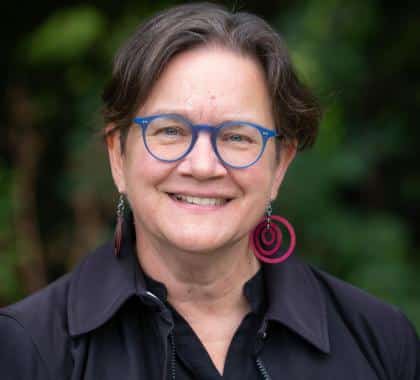While on a recent walk in the woods, a friend told me that a tree planted in a small clearing of an old forest has a much better chance of growing successfully than a tree planted in an open field. I was skeptical at first since the tree in the field gets all the sun, the water, and the space to grow freely. Who wouldn’t want to be that tree? Apparently, the roots of the young forest tree are able to follow the many pathways created by trees that had grown there before. In fact, the roots of many trees can graft themselves to one another, creating a strong and resilient system of hidden life beneath the earth that sustains the newer trees over time. The stronger trees can share resources with the younger trees so that the whole forest becomes healthier. The established trees protect the saplings from wind and storms until their roots are more established.
This made me think of the veritable forest of teachers who serve as mentors to the associates in our Associate Teacher Program. While many educators literally start their careers “in the field” on their own, needing to learn on the job without the benefit of wisdom from those who have been at it for a while, our associate teachers have chosen wisely by placing themselves at Belmont Day. While here, their roots grow deeper, and they get the chance to collaborate and innovate with colleagues who want them to succeed and grow.
A few weeks ago, I posed two questions to our associate mentors in order to gauge what it is about the mentorship model that sustains them and encourages them to put in the work it takes to support an aspiring teacher.
- What are the benefits of having an associate in your classroom?
- What have you learned as a result of being a mentor to an associate?
Below are a handful of the many responses that offer up a sense of the symbiotic relationship that develops in classrooms where mentors and associates are learning from each other.
“I benefited from needing to think critically about aspects of my teaching practice that had not been front of mind previously. Having an associate in the classroom has inspired me to try new things. Last year, I had an associate who was particularly interested in learning how to facilitate meaningful class discussions. His goal required that I include more space for full class discussions so that I could model for him, and then continue to preserve that time so he could work on his own facilitation strategies. It was an approach to social studies class that I had been hesitant to do earlier, and I was very excited to see that it was successful!”
“Being a mentor has absolutely made me a better teacher—every day, I have to think about how and, more importantly, why I do something. We do so much as teachers based on instinct, but verbalizing my thought process to another person makes me think through things much more deeply. I also get fresh, new ideas from each amazing associate I’ve been lucky enough to mentor.”
“Some of the many benefits of having an associate in our classroom are partnership, creative collaboration, and emotional support, to name a few. But I think the greatest benefit to having an associate is the consistent reminder that celebrating the highs is so much more important and impactful than wallowing in the lows. Teaching is filled with incredible ups and downs, and as mentors, we are responsible for helping guide our associates toward celebrating their accomplishments instead of constantly focusing on their learning curves. And what better way to mentor someone in this practice than to do it yourself? Having an associate always reminds me that as deeply as I may be feeling the lesson that didn’t go as planned or the activity that did not have the impact I hoped it would, the only thing I can do is improve it for next time and move forward to the next moment in my teaching day.”
“Associates have such a positive impact on students and student learning. By having an additional teacher in the room, students are able to break out and work in small groups more often, and students benefit from more targeted, intentional, and differentiated instruction across content areas throughout their day.”
Clearly, mentorship matters not only for those being mentored but also for those doing the mentoring. The collective discovery that awaits every mentor and associate partnership is profoundly impactful not only for the adults but for our students as well. I’m so grateful that BDS continues to support the growth of new teachers and nurtures the forest that enriches the educational landscape.


